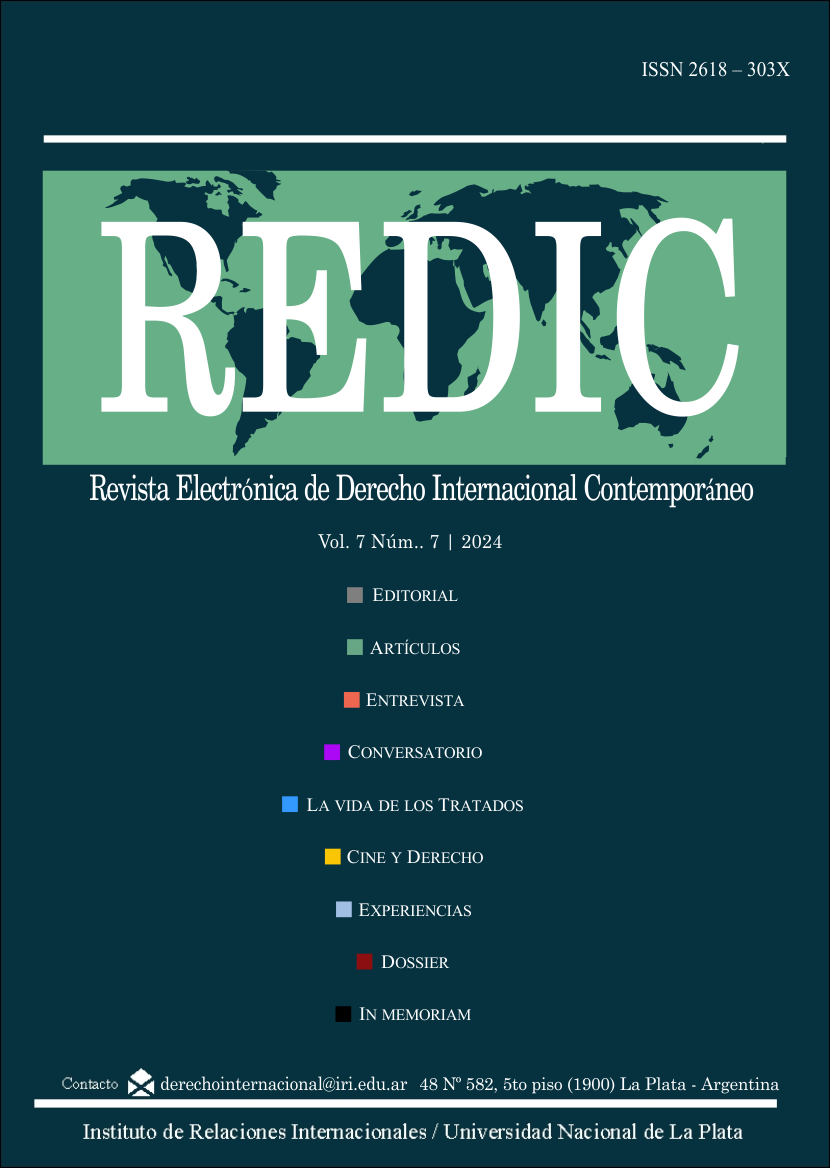From “Lubanga” to “Ongwen”: Gender-based reparations at the International Criminal Court
DOI:
https://doi.org/10.24215/2618303Xe074Keywords:
gender-based reparations, transgenerational trauma, International Criminal CourtAbstract
Two decades after the beginning of the International Criminal Court (ICC), today we can claim that this court's procedural practice has implied a true turn in the way that the role played by victims in the international criminal system is understood. For the very first time their right to take part in the process and to receive reparations is actually being recognized. In order to be considered as victims, either natural or juridical persons need to prove that they have sustained some damage as a result of the commission of a crime within the jurisdiction of the ICC. That is to say, following the “proximate cause” criterion, victims must prove that a crime is sufficiently related to the damage, thus making it its cause. In its latest decisions, the ICC has been making a broader interpretation of this criterion and widened the types of damage included and, therefore, the victims who may take part in the proceedings or be granted reparations. This work deals with some of these decisions, paying special attention to the transgenerational trauma suffered by children born to women who were victims of sexual and gender violence. The question we set out to answer here, then, is whether the ICC is actually complying with the gender requirement included in article 54.1. b of the Rome Statute.
Downloads
References
Gil Gandía, C. (2020). La reparación de las víctimas de crímenes internacionales y la Corte Penal Internacional. Thomson Reuters Aranzadi.
Lostal, M. (24 de mayo de 2021). The Ntaganda Reparations Order: a marked step towards a victim-centred reparations legal framework at the ICC. EJIL: talk! Blog of the European Journal of International Law. https://www.ejiltalk.org/the-ntaganda-reparations-order-a-marked-step-towards-a-victim-centred-reparations-legal-framework-at-the-icc/
Opinio Iuris. (5 de noviembre de 2024). The Ongwen Chamber’s Reparations Order and the “Ongwen Exception”: A Concept of Dehumanization, Invisibility and Racism. http://opiniojuris.org/2024/04/13/the-ongwen-chambers-reparations-order-and-the-ongwen-exception-a-concept-of-dehumanization-invisibility-and-racism/
Uprimny Yepes, R. y Saffon, M. P. (2009). Reparaciones transformadoras, justicia distributiva y profundización democrática. En C. Díaz Gómez, N. C. Sánchez y R. Uprimny Yepes (Eds.), Reparar en Colombia: los dilemas en contexto de conflicto, pobreza y exclusión (pp. 31-70). DeJusticia.
Walker, M. U. (2016). Transformative Reparations? A Critical Look at a Current Trend in Thinking about Gender-Just Reparations. International Journal Of Transitional Justice, 10(1), 108-125. https://doi.org/10.1093/ijtj/ijv029
Additional Files
Published
How to Cite
Issue
Section
License
Copyright (c) 2024 Carmen Montero Ferrer

This work is licensed under a Creative Commons Attribution-NonCommercial-ShareAlike 4.0 International License.
Aquellos autores/as que tengan publicaciones con esta revista, aceptan los términos siguientes:
- Los autores/as conservarán sus derechos de autor y garantizarán a la revista el derecho de primera publicación de su obra, el cuál estará simultáneamente sujeto a la Licencia de reconocimiento de Creative Commons (BY-NC-SA) 4.0 que permite a terceros compartir la obra siempre que se indique su autor y su primera publicación esta revista, no se haga uso comercial, y si se remezcla, se transforma o se crea a partir del material, se debe distribuir bajo la misma licencia del original.
- Los autores/as podrán adoptar otros acuerdos de licencia no exclusiva de distribución de la versión de la obra publicada (p. ej.: depositarla en un archivo telemático institucional o publicarla en un volumen monográfico) siempre que se indique la publicación inicial en esta revista.
- Se permite y recomienda a los autores/as difundir su obra a través de Internet (p. ej.: en archivos telemáticos institucionales o en su página web) antes y durante el proceso de envío, lo cual puede producir intercambios interesantes y aumentar las citas de la obra publicada. (Véase El efecto del acceso abierto).





















